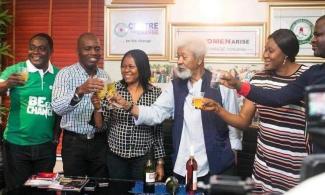
Human rights activist and President of Women's Arise and Centre for Change, Dr Joe Okei-Odumakin, has celebrated Nigerian playwright, Prof. Wole Soyinka as he turns 89 on Thursday.
Soyinka was born on July 13, 1934, in Abeokuta, southwest Nigeria.
Okei-Odumaki eulogised Soyinka, popularly called Kongi, in a press release on Thursday, in which she described living to see the Nobel Prize winner as a rare privilege for the human race.
Kongi's Harvest is a 1965 play written by Soyinka. It was later adapted as a film of the same name, directed by the American Ossie Davis.
She said Soyinka’s legacy has become eternal and cherished by all generations.
The statement reads: “For those who understand, the Grace of waking up is beyond knowledge, but waking up to share the earth with some extremely rare humans is a grand privilege.
“Every such cycle is then cherished for seeing and the spectacle. We again celebrate Kongi whose genius of poesy captivates us in its gripping hold, not once not twice but lifelong.
“We pray for ourselves, nay, for you to be here much farther into your literary royalty.
“That you, Kongi, being already eternal in text, will experience your 'eterna' in health, with more generations into your living ancestry.”
Soyinka was the first Sub-Saharan African to receive the Nobel Prize in Literature in 1986, for "fashioning the drama of existence in a wide cultural perspective and with poetic overtones."
Soyinka was born into a Yoruba family and enrolled at Government College in Ibadan in 1954, and then at University College Ibadan and the University of Leeds in England.
He worked with the Royal Court Theatre in London after studying in Nigeria and the United Kingdom and went on to compose plays that were staged and broadcast in both nations.
Soyinka has been a vocal opponent of successive Nigerian (and African) administrations, particularly the country's several military dictators, as well as other political tyrants. During General Sani Abacha's rule which was between 1993 and 1998, Soyinka fled Nigeria on a motorbike via the "NADECO Route." Later, Abacha issued a death sentence on him "in absentia." Soyinka returned to Nigeria after civilian authority was restored in 1999.
He was Jailed for 22 months as civil war ensued between the Nigerian government and Biafra after he had sneaked into the East to meet with the late separatist leader, Chukwuemeka Odumegwu Ojukwu, to try to broker peace.